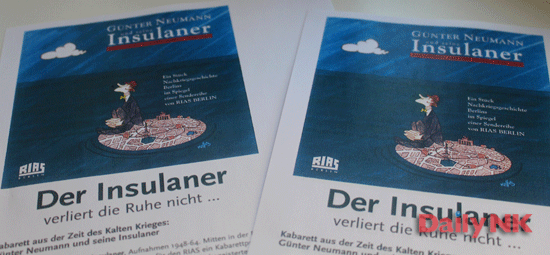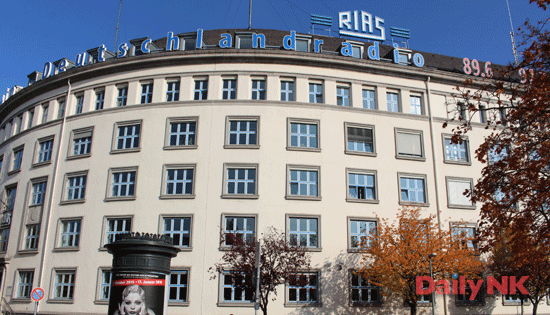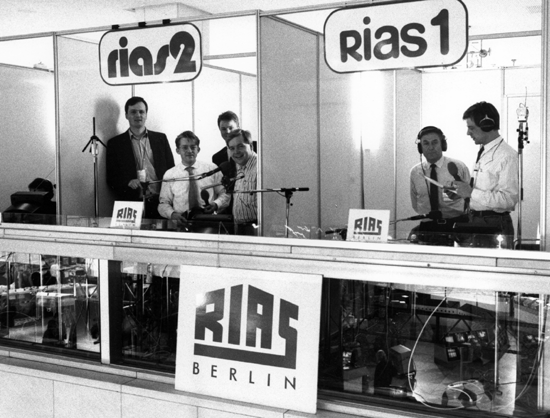“During their separation, West Germany sent
radio broadcasts into East Germany. These broadcasts did not try to glamorize
the lives of people in the Western World. Instead, they attempted to shine a
light on the positive and negative aspects of the international community that
Easterners had been cut off from. In this way, Western Germany acted as a
faithful messenger in delivering information about the true state of the world
across the fortified border,” said Patrick Garber, editor of Deutschland Radio
and a former reporter for RIAS, or the Broadcasting Service in the American
Sector, founded in 1946.
In order to stimulate the weakening of the
Communist Regime in East Germany, West Germany enacted the policy of delivering
truthful and reliable news to the information-starved residents in the East.
Editor Garber continued, “We really tried
to emphasize the importance of delivering information in stark terms with no
exaggeration.” RIAS editor-in-chief and Deutschewelle reporter Hans Jürgen
Pickert added, “We tried our best to resist engaging in counter propaganda.
Even when relaying stories about the East German government, we tried not to do
so in a way that was not outwardly and directly provocative. Instead, we
pursued a neutral, objective, and honest style of reporting.”
For this reason, the German media experts
advised that overtly anti-communist broadcasts are unlikely to have an impact
in changing the hearts and minds of ordinary North Koreans.
When asked about this, Detlef Kühn, the
former director of Sachsen Radio and former president of the All German
Institute, had the following to say: “The North Koreans themselves are directly
experiencing the results of the regime’s policies. If the civilian broadcasts
into North Korea focus on how South Korea has changed and is continuing to
change, then the North Koreans will be able to make up their own minds about
the regime. This is the single easiest way to increase their trust and
confidence in the reliability of South Korean news radio.”
Breaking Down the Propaganda
Additionally, as Western Radio broadcasts
transmitted objective information, the East Germans become more and more able
to have epiphanies about the true nature of the communist regime. After
continuously getting outside information, East Germans were able to compare and
critically examine the propaganda released through East Germany’s strictly
controlled media outlets.
In particular, there was one broadcast
concerning a 1953 labor strike in East Berlin. In contrast with the heavily
censored Eastern media, RIAS offered detailed reports about the strike. As a
result, Easterners realized that the government pronouncement that “Our country
is the idea land for laborers,” was a complete falsehood.
Former RIAS reporter Hans Jürgen Pickert
added, “RIAS broadcast very straightforward coverage of the protests, including
the slogans of the strikers. In this way, the strike spread from East Berlin
out into the other regions. If RIAS did not exist, then the protests and the
sentiment supporting them would not have had the same opportunities to spread
around East Germany as they did. I believe this had an effect on the
development of German history. Because of the information brought to residents
through RIAS, people from all over the country were able to participate in the
protests.”
Pickert continued, “A guest with knowledge
of communist systems came on a broadcast and said that, ‘the reality of East
Germany is quite different from the writings of Marx and Lenin. In the same
way, broadcasts on the Korean peninsula have the power to expose the chasm
between North Korea’s state ideology and the true condition of the country.”
 A booklet describing the radio program ‘Die Insulaner,’ which was a big hit in both East and West Germany. Image: Daily NK |
Broadcasts must foster a sense of belonging
In addition to providing simple
information, West German broadcasts also attempted to shed light on the lives
of people in the Western world. About this, Editor Garber said, “We tried our
best to communicate what our culture was like. How does a hamburger taste? What
pop songs are famous? These sorts of feelings and experiences.”
By providing programs that included games,
music, quizzes, and other light entertainment, the broadcasts were able to
capture the attention or East and West Germans alike. “We organized a satirical
news program and also gave Easterners an opportunity to hear what a Western
advertisement sounds like,” he explained.
Pickert said, “An archetypal example is
the satirical program called ‘Die Insulaner.’” Die Insulaner means ‘People on
the island.’[This ‘island’ refers to West-Berlin, which was surrounded by GDR
(East-Germany) during Germany’s separation.] In this program, East German
bureaucrats were presented as ridiculous buffoons. Although it was also aimed
at a West German audience, the show became immensely popular in the East, where
it provided some cathartic relief.”
West German radio producers and writers
took special precautions to prevent their East German listeners from developing
an inferiority complex. Emphasis was placed on respecting East Germans and
speaking to them on even terms.
Because of this, the experts urged South
Korean broadcasters to attempt to earn the trust of their North Korean
listeners and inspire them to contemplate unification by building off of the
German example.
Editor Garber remarked, “It’s important to
give the listeners a sense of belonging and ownership of the broadcasts.
Deliberate effort must be made to avoid bending the truth or causing Northern
listeners to feel inferior.”
“I hope that the South Korea-to-North Korea
broadcasts could go beyond the political content to really foster a sense of
shared identity and unity. To truly accomplish unification, we need to
emphasize the human element by considering how North Koreans think and feel in
order to show them that they are not being left behind,” he added.
Ki Woong Sohn is the senior researcher of
Korea Institute for National Unification. He said, “If you carefully inspect
the role of German media in the unification process, it becomes apparent what a
big contribution we can make with radio broadcasts to North Korea. This is
especially true considering how much more difficult it is to conduct
people-to-people exchanges on the Korean Peninsula compared to East and West
Germany during the Cold War. The broadcasts provide North Korean people with an
indirect way to experience our country and our culture.”
 The headquarters of Deutschland Radio in Berlin. It was created in 1994 after West Germany’s Deutschlandfunk and Rias were merged with East Germany’s Rundfunk Day der DDR. Image: Daily NK. |
*This article has been brought to you
thanks to support from the Korea Press Foundation.


















